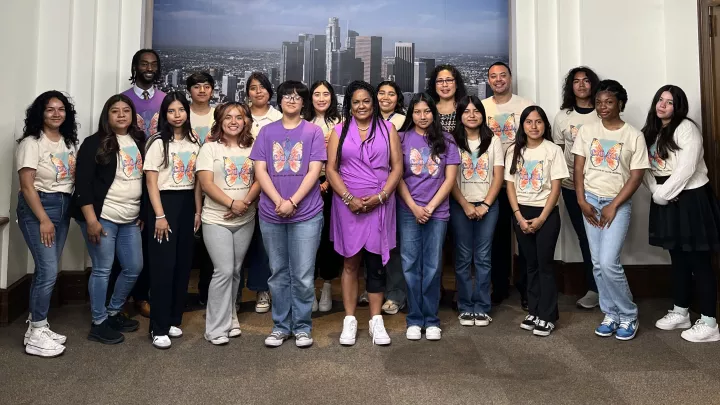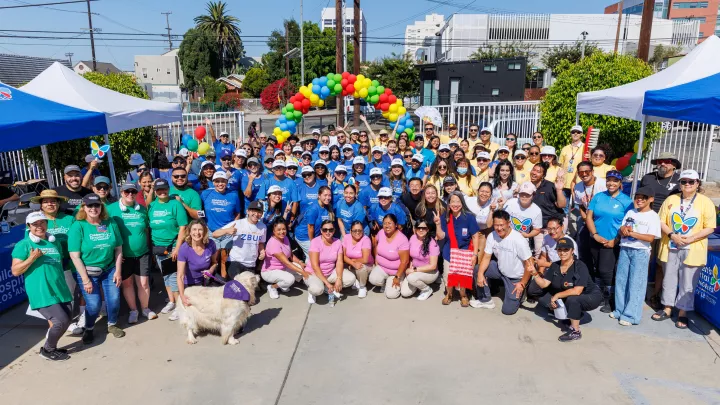Intervention Research
Intervention research at CHOIR focuses on the design, implementation and evaluation of prevention and health-promotion interventions with diverse populations and in a range of settings, such as hospitals, clinics, schools and community clinics.
Utilizing a variety of qualitative and quantitative methodological approaches, CHOIR researchers examine important health issues, identify educational and intervention opportunities, and attend to these opportunities by developing new interventions and adapting evidence-based interventions for unique populations.
Intervention Research at CHOIR:
Young Men's Adult Identity Mentoring
This study is focused on adapting an existing, evidence-based HIV prevention intervention, Project AIM (Adult Identity Mentoring), for use with 18-24 year old African American men who have sex with men (MSM). Project AIM has demonstrated short- and long-term increases in sexual abstinence and reductions in sexual activity among African-American adolescent males. The intervention seeks to steer adolescents away from risky behavioral choices by offering alternative avenues to define themselves as adults.
Previous research emphasizes the need for prevention interventions that are tailored to meet the unique needs and risk profiles of young African American MSM, who are much more likely than young Latino and Caucasian MSM to have experienced various forms of violence and victimization; sexual and social discrimination based on race; institutional racism and internalized homophobia. These experiences of racism, homophobia and violence are in turn significantly associated with illicit drug use, alcohol misuse and involvement in HIV sexual risk behaviors.
This study aims to: adapt Project AIM so that it is developmentally appropriate and culturally relevant for use with young African American MSM in Los Angeles; pilot test the feasibility and acceptability of the adapted intervention, Young Men’s Adult Identity Mentoring (YM-AIM); and to identify barriers and facilitators with respect to implementing YM-AIM in community settings.
Principal Investigator: Michele D. Kipke
Evaluation of Overdose Prevention Programs for Injection Drug Users
Injection drug users (IDUs) are a population at elevated risk for both HIV infection and fatal drug overdose, which is the single greatest cause of mortality among IDUs in the U.S. A heroin overdose can be safely reversed with the administration of naloxone, an opioid antagonist, which is distributed by overdose prevention programs (OPPs) in 15 states. Despite the common-sense notion that these programs "work," scientifically designed evaluations of OPPs are almost non-existent and outcomes are still poorly defined.
This study is designed to investigate changes in overdose response and other drug-related health behaviors among IDUs participating in two OPPs in Los Angeles. The study addresses the following three specific aims: observe changes in overdose response behavior among IDUs; examine whether participating in overdose prevention training or overdose response (i.e. performing a "rescue") affects other drug-related health behaviors; and investigate structural, social, and psychological barriers towards enrolling IDUs into OPPs.
The results of this study will fill a critical gap in the public health literature on opioid overdose and the effects of OPPs among IDUs. Additionally, the study will provide important information about how the effects of participating in overdose prevention training and practicing prevention skills may be associated with non-overdose related health behaviors, such as HIV risk behavior.
Site Principal Investigator: Ellen Iverson
Social Robotics and Autism Spectrum Disorders Study
This research project explores the use of socially assistive robotics to build social interaction and communication skills among children with autism spectrum disorder (ASD). Children diagnosed with an ASD have impairments related to social interaction and communication. This ongoing study focuses on using social robots as possible means for aiding ASD diagnosis and/or intervention/therapy by evaluating social and communicative behaviors shown by children with autism spectrum disorders when interacting with robots designed to elicit social behaviors. This research, supported with grants from Nancy Lurie Marks Family Foundation, Autism Speaks, Foundation, and the National Science Foundation, is a collaboration of the Interaction Lab at the USC Viterbi School of Engineering, Children's Hospital Los Angeles and Autism Speaks.
Site Principal Investigator: Marian Williams
Child-Computer Interaction Study
Children with autism spectrum disorders often have trouble communicating and interacting socially with adults and other children. This research project aims to promote social communication in children with autism spectrum disorders using animated computer characters in clinical settings. Our long-term goal is to create portable interactive tools, informed by clinical psychology, which can be adapted to the specific needs of an individual child. This is a joint project with the Viterbi School of Engineering at USC, the Keck School of Medicine at USC and Children's Hospital Los Angeles, supported by Autism Speaks and the National Science Foundation.
Site Principal Investigator: Marian Williams
Social Motivation in Children With and Without Autism
Children with autism spectrum disorders show symptoms of atypical social behaviors at an early age, including deficits in social behavior, repetitive/restricted behavior, and language and communication difficulties. This exploratory study examining autism heterogeneity will test two possible explanations for decreased social interaction: either the social interaction phenotype in children with ASDs is due to an aversion to social interaction, or alternatively, to a lack of reward from social interactions. This information will help us understand the causes of decreased social interaction and facilitate individualized intervention strategies in children with ASDs. This study is a collaboration of the Zilkha Neurogenetic Institute, the USC Viterbi School of Engineering, and Children's Hospital Los Angeles.
Principal Investigator: Barbara Thompson


